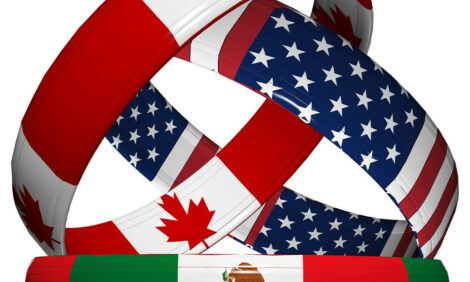



Newspaper Investigates Welfare of Imported Meat
UK - One quarter of the meat sold in the UK is imported from countries with lower standards of animal welfare, according to a new investigation.Farmers and consumers demand greater import restrictions as an investigation by The Guardian reveals many bacon, pork and poultry products come from nations with lower animal welfare standards.
It found at least one-quarter of meat on sale in the UK comes from farms that do not have to meet national standards for animal welfare. The poor conditions in which the animals can be kept include greater crowding in chicken and turkey sheds, cage-like pens for female pigs and physical castration with no anaesthetic for boars.
The UK has relatively high standards of animal welfare compared with the rest of the world, including the European Union. However, there are no restrictions on importing meat from countries that do not impose such standards, where costs are often lower. There are renewed calls from consumer and farming groups for better labelling of products and action to bring standards into line, at least across the EU.
Sue Davies, chief policy adviser for the consumer lobby group, Which?, said: "Sometimes people may be making false assumptions about products, sometimes they may have genuinely lower standards – I don't think people know what the situation is."
Kevin Pearce, head of food and farming at the National Farmers Union (NFU), said some overseas farmers would be required by retailers to meet higher standards than their national minimums. However, there is particular concern over the quality of imported food used in restaurants, pubs, canteens and other catering outlets, which now accounts for half of the money spent on food in the UK.
He told The Guardian: "If consumers know anything about it, they probably think all the standards are the same. It's not about farmers whingeing, we want to be able to compete fairly. If the customers say 'that's the standard we want', we want to do our best to produce it. Where we have a problem is if the price is too high or the supply too short they'll go elsewhere to get it."
Public concern about the costs of modern food has been growing after a number of health scares, high-profile books and, last week, the UK premiere of the Oscar-nominated documentary Food Inc, which claims to expose the "highly mechanised underbelly" of the industry.
The NFU has previously complained that the differences in standards are unfair to UK farmers, for example claiming that half of the pork market went overseas when sow pens and tethering were banned.
However the scale of the problem has been revealed by The Guardian's analysis of the most recent full-trade figures available, for 2007. It found that:
- More than half of bacon sold in the UK comes from the Netherlands, Denmark, Germany and Italy, where farmers can keep sows in smaller pens and for longer periods.
- 43 per cent of other pork products come from Denmark, Germany the Netherlands, Belgium and Luxembourg, where the same poorer conditions on pig farms are allowed.
- One-quarter of poultry sold in the UK comes from seven European countries and Brazil, which allow higher stocking of chickens and do not force farmers to use more comfortable dry bedding.
- Three per cent of beef is imported from Brazil, where practices including hot branding, castration and dehorning of cattle can be carried out without anaesthetic. Products from those major importers accounted for about one-quarter of all meat sold, by weight, in the UK that year. Total imports of pork, poultry, beef and veal made up one-third of all meat sales, and it is likely that some of the remaining imports came from smaller trading countries also with lower standards.
Further Reading
| - | You can view the full article by clicking here. |






